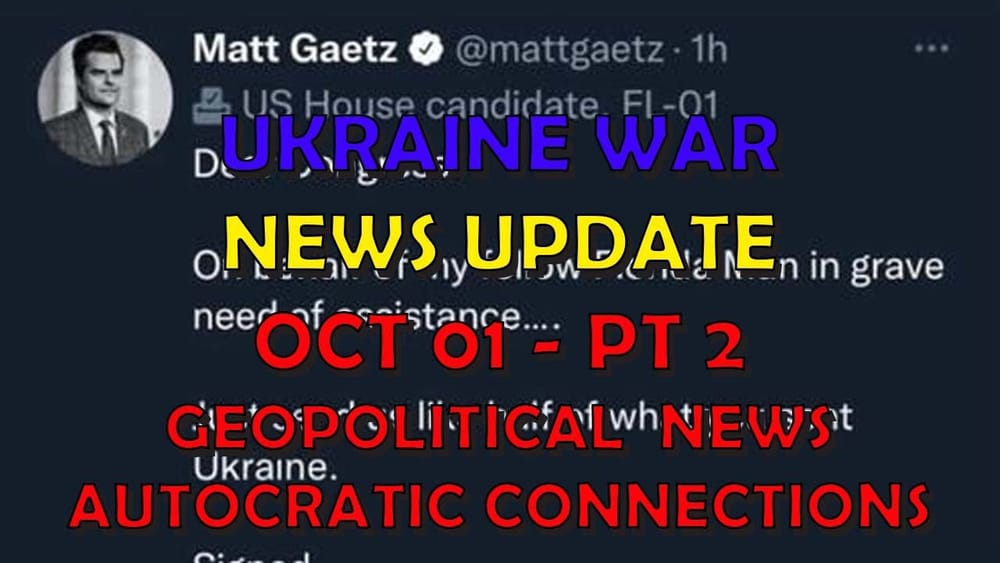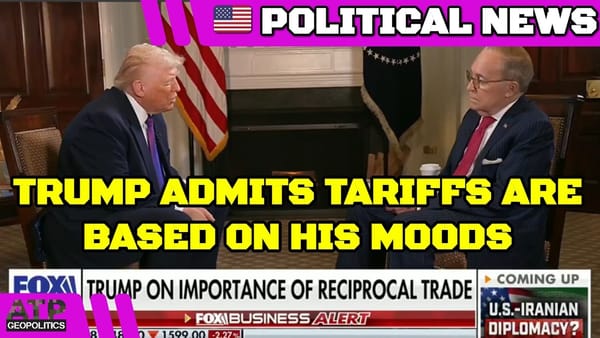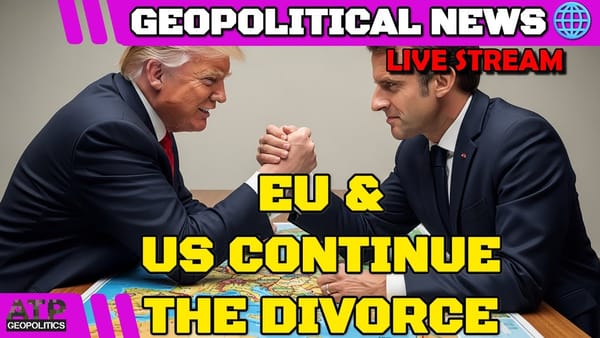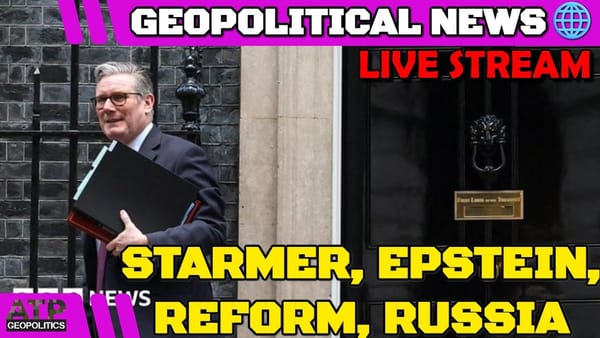Ukraine War Update NEWS: Geopolitical News, Autocratic Connections
Table of Contents 📖
"A vote for Trump is a vote for Putin, a vote for Le Pen is a vote for Putin, a vote for Kikl, Fizzo, Orban, Vildes, Abascal, Van Grieken is a vote for Putin."
Hello Team
🎦 00:00-00:34⏩
Jonathan welcomes viewers to an "ATP Geopolitics" video, a geopolitical update for October 1st, 2024. He mentions an upcoming live stream in 90 minutes with a polling and voting expert from the "Voting Trends" channel to discuss the US election and polls.
Return to top⤴️
Potential Shift in Ukraine War Negotiations
🎦 00:34-06:33⏩
Jonathan discusses a potential shift in the Ukraine war, suggesting the "beginning of the end" might be near, although the end could be protracted. He notes:
- International pressure might be on Zelensky to seek a settlement, potentially benefiting Russia in the short term.
- Russia currently holds a stronger negotiating position due to territorial gains.
- Sanctions against Russia might weaken due to pro-Russia sentiment in Europe (Austria, Serbia, Slovakia, Hungary, Spain, Germany, Italy) and the potential return of Trump in the US.
- Jonathan expresses concern about this shift, fearing a suboptimal outcome for Ukraine.
Jonathan cites a Financial Times article:
- European diplomats at the UN General Assembly noticed Ukrainian officials are more open to ceasefire discussions, even with Russian troops on Ukrainian territory.
- Ukraine's new Foreign Minister, Andriy Sibiga, seems more pragmatic about "land for security" negotiations.
- Jonathan cautions against this information becoming public as it strengthens Russia's hand.
Jonathan believes:
- Russia cannot win the war outright but Ukraine may struggle to fully prevail.
- The most likely outcome is a negotiated settlement, potentially unfavourable to Ukraine unless Russia pays a significant price (continued sanctions).
- The rise of pro-Russia sentiment in Europe and the US threatens the effectiveness of sanctions.
Russia's Nuclear Doctrine Shift
🎦 06:33-15:18⏩
Jonathan highlights a concerning development: Russia's formal change to its nuclear doctrine. He reads excerpts from a Kiev Independent opinion piece, summarising the changes:
- Russia now considers aggression against it by a non-nuclear state "with the participation or support of a nuclear state" as a joint attack, justifying a nuclear response.
- This is a clear threat towards Western nations providing military aid to Ukraine.
- The doctrine outlines specific conditions for using nuclear weapons, such as receiving "reliable information" about incoming air and space attacks.
- These changes apply to both Russia and Belarus.
Jonathan analyses:
- The pre-announced changes are primarily a psychological operation aimed at deterring Western support for Ukraine.
- He questions the significance of these changes given the West's existing military support for Ukraine, including strikes on Crimea (considered Russian territory).
- Despite Russia's doctrine allowing for nuclear retaliation, they have not used nuclear weapons, suggesting political calculations outweigh doctrinal considerations.
- Jonathan suggests NATO's early warning to Russia about severe conventional retaliation for any nuclear strike has likely deterred them.
Jonathan concludes:
- Escalation against NATO is unlikely if Moscow believes the alliance's commitment to mutual defence.
- Western leaders must firmly communicate the severe consequences of using nuclear weapons in Ukraine to prevent further escalation.
Peace Plans and Russian Appeasement
🎦 15:18-23:36⏩
Jonathan criticises various peace initiatives, highlighting their appeasement of Russia:
- He mentions the Brazilian and Chinese peace initiative which doesn't require Russian troop withdrawal from Ukraine. Jonathan sees this as favouring Russia.
- He criticises Viktor Orbán, Hungary's Prime Minister, for pushing pro-Russian narratives and supporting the aforementioned peace initiative.
Jonathan praises Jens Stoltenberg, outgoing NATO Secretary General:
- For advocating support for Ukraine's peace plan over China's, demonstrating strong rhetoric against pro-Russian appeasement.
Jonathan is concerned about Turkey's support for the Chinese-led peace initiative:
- He finds this unexpected for a NATO member but attributes it to Turkey's desire to join BRICS and Erdogan's increasingly dictatorial rule, leading Turkey eastward, aligning more with Russia and China.
Jonathan then discusses Trump's proposed peace plan:
- He criticizes it for potentially involving ceding Ukrainian territory to Russia.
- He quotes H.R. McMaster, former National Security Advisor to Trump, who calls the plan "a real myth" and highlights the need for favourable military outcomes to achieve a favourable political settlement.
Jonathan firmly believes:
- Ukraine needs a strong military position to achieve a favourable outcome in any peace negotiations.
- He cites the example of potential negotiations early in the war (March 2022) when Russia was in a stronger position and the potential for a much worse outcome for Ukraine.
Jonathan highlights:
- Zelensky's call for Trump to reveal his plan, fearing its implications for Ukrainian independence and seeking clarity about US support.
- The Kremlin's scepticism about Trump's claim of ending the war in a day, urging for realism.
- McMaster's view that a favourable settlement for Ukraine hinges on convincing Putin that he is losing the war.
Polish Elections and US Politics
🎦 23:36-28:33⏩
Jonathan discusses the recent Polish election and its implications for Ukraine:
- He expresses concern over Andrzej Duda, a member of the right-wing populist Law and Justice Party (PiS), echoing Trumpian Republicanism.
- He acknowledges PiS's pro-Ukraine stance but is wary of their right-wing populist ideology.
- He notes PiS's significant loss in the election, preventing them from forming a government.
- He highlights the formation of a new coalition government by Donald Tusk, a pro-Ukraine politician.
Jonathan expresses concern about Duda's recent trip to Pennsylvania, a state with a large Polish-American population:
- Duda, campaigning for Trump, claims a Trump presidency would be beneficial for Ukraine, contradicting expert analysis.
- Jonathan believes a Trump presidency would be detrimental to Ukraine.
Jonathan discusses Russian disinformation efforts in the US:
- The FBI disclosed a Russian campaign utilizing Twitter (X) to spread disinformation, exploiting its relaxed content moderation policies.
- Jonathan contrasts this with other platforms like TikTok that have removed Russian content.
- He expresses concern about the prevalence of Russian disinformation on Twitter, using the example of Hurricane Helene coverage.
Ukraine as a Political Football in the US
🎦 28:33-33:45⏩
Jonathan is dismayed by the use of Ukraine aid as a political football in US domestic politics, particularly surrounding Hurricane Helene relief efforts. He provides examples:
- Donald Trump Jr. suggesting North Carolina would get more attention if it "identified as Ukraine", implying a disparity in aid distribution.
- Matt Gaetz, a Republican lawmaker, urging Congress to send hurricane relief funds equivalent to half of the aid sent to Ukraine.
Jonathan refutes these claims:
- He highlights Biden's proactive release of FEMA funds before the hurricane hit, contrasting it with Trump's inadequate response to Hurricane Matthew when he was president.
- He fact-checks Trump's claims about the Biden administration's lack of support for Georgia, pointing out Governor Brian Kemp's public gratitude for Biden's assistance.
- Jonathan criticizes Trump for staging a political stunt and spreading misinformation about the hurricane relief efforts, using Ukraine as a tool to further his agenda.
Jonathan is angered by:
- The spread of misinformation about Ukraine aid, especially claims that it's hindering hurricane relief efforts.
- The exploitation of a natural disaster for political gain.
Jonathan contrasts this with:
- The Biden administration's genuine efforts to address the hurricane damage and support affected states.
- Jonathan urges viewers to be critical of the information they encounter and to vote accordingly.
Sanctions Circumvention and International Condemnation
🎦 33:45-36:26⏩
Jonathan discusses a BBC investigation revealing the circumvention of sanctions:
- Western-made parts are still reaching Russian ships despite sanctions, highlighting the ongoing challenge of enforcement.
- He cites the use of third countries, like China and Turkey, as intermediaries to bypass sanctions.
- He provides an example of a Danish company, Grundfos, exporting a ship pump to Russia via a Chinese intermediary.
Jonathan is frustrated by:
- The continued flow of Western technology to the Russian military, despite sanctions.
- The exploitation of loopholes and intermediaries to circumvent sanctions.
Jonathan ends on a positive note:
- The G7 nations reaffirmed their commitment to never recognizing Russia's illegal annexation of Ukrainian territory, condemning the aggression and pledging continued support for Ukraine.
Autocratic Networks and the Global Far-Right
🎦 36:26-45:35⏩
Jonathan launches into a passionate analysis of the interconnectedness of far-right movements and autocratic regimes, arguing their rise is no coincidence. Jonathan posits:
- A web of connections exists, linking far-right figures like Tucker Carlson and Viktor Orbán through lobbying firms and conservative organizations.
- Russian influence, often channeled through Hungary, plays a significant role in funding and bolstering these movements.
Jonathan details these connections:
- Tucker Carlson's father sits on the board of a lobbying firm whose primary client is Viktor Orbán.
- CPAC (Conservative Political Action Conference), a prominent US conservative gathering, has held events in Budapest and featured Orbán as a guest.
- Heritage Foundation, a conservative think tank, receives funding from Hungarian organizations with ties to the Kremlin.
- The Heritage Foundation authored "Project 2025", a policy blueprint for a potential Trump presidency, suggesting a direct line of influence from Russia to a potential US administration.
Jonathan believes:
- Russia is strategically cultivating these connections to destabilize Europe and undermine Western democracies.
- These efforts are alarmingly effective, as evidenced by the rise of far-right parties across Europe and the US.
Jonathan lists examples:
- Vox in Spain.
- Lega in Italy.
- Confederation in Poland.
- AfD in Germany.
- Rassemblement National in France.
- FPÖ in Austria.
- Fidesz in Hungary.
- Smer in Slovakia.
Jonathan is deeply concerned by:
- The financial and ideological ties between these movements and the Kremlin.
- The success of Russia's disinformation campaigns in amplifying these movements.
- The vulnerability of Western democracies to these divisive tactics.
Germany-Russia Dialogue, Russian Oil Transport, and Budget Increase
🎦 45:35-47:04⏩
Jonathan covers several news items:
- German Chancellor Olaf Scholz is planning his first direct conversation with Putin in nearly two years, potentially signalling a move towards negotiations.
- Russia is using unseaworthy tankers to transport oil through the Gulf of Finland, raising concerns about environmental risks and sanctions evasion.
- Russia plans to increase its budget for Putin's presidential administration by 25.6%, potentially indicating high inflation or a consolidation of power.
Wrap up
🎦 47:04-50:19⏩
Jonathan concludes by expressing his deep concern about the future of humanity. Jonathan reflects on:
- The dangerous coalescence of "the worst of humanity" around harmful ideologies.
- The weaponization of immigration as a political issue, often leading to the support of autocratic agendas.
Jonathan emphasizes:
- The need to address immigration and other global issues compassionately and thoughtfully.
- The importance of remaining vigilant against the rise of authoritarianism and disinformation.
Jonathan reassures viewers:
- He will continue reporting on these challenging times.




